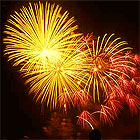 A
well-known new year tradition is the making of New Year's
resolutions, that is making resolutions on New Year's Day (to
improve oneself or do something good) and try to fulfill it. It is
believed that the early Babylonians were the first to start this
tradition and ever since, people all over the world have been making
and breaking New Year Resolutions. Even the early Christians
believed that the first day of the year should be spent reflecting
on past mistakes and resolving to improve oneself in that year. But
most find this hard to stick to. With time, the resolutions have
also changed. While the early Babylonian's most popular resolution
was to return borrowed farm equipment, people today resolve to lose
weight, quit smoking or stop drinking alcohol.
A
well-known new year tradition is the making of New Year's
resolutions, that is making resolutions on New Year's Day (to
improve oneself or do something good) and try to fulfill it. It is
believed that the early Babylonians were the first to start this
tradition and ever since, people all over the world have been making
and breaking New Year Resolutions. Even the early Christians
believed that the first day of the year should be spent reflecting
on past mistakes and resolving to improve oneself in that year. But
most find this hard to stick to. With time, the resolutions have
also changed. While the early Babylonian's most popular resolution
was to return borrowed farm equipment, people today resolve to lose
weight, quit smoking or stop drinking alcohol.
 It
is impossible to imagine a New Year celebration without the usual
midnight fireworks. The Chinese are credited with inventing
fireworks and it is they who are believed to have used them first in
their New Year's celebrations with spectacular effect. As a result,
noisemaking and fireworks - which were primitively thought to dispel
evil spirits and bring good luck, began to be used on New Year's eve
for celebration purposes. Depending on the country, individuals may
be allowed to burn fireworks on New Year's Eve, even if it is
forbidden the rest of the year.
It
is impossible to imagine a New Year celebration without the usual
midnight fireworks. The Chinese are credited with inventing
fireworks and it is they who are believed to have used them first in
their New Year's celebrations with spectacular effect. As a result,
noisemaking and fireworks - which were primitively thought to dispel
evil spirits and bring good luck, began to be used on New Year's eve
for celebration purposes. Depending on the country, individuals may
be allowed to burn fireworks on New Year's Eve, even if it is
forbidden the rest of the year.
 Feasting
is an all important part of New Year celebrations and certain foods
are thought to bring good luck if eaten on New Year Eve. Traditional
Good Luck foods on New Year are considered to be all those goodies
that come in circular or ring-like shapes, for such shapes are
believed to symbolize "coming full circle," or a complete year's
cycle. It is mainly because of this that the Dutch eat donuts and
pretzels on New Year's Day. Legumes with ham is said to bring in
luck and prosperity in many regions of US. Black-eyed peas and
cabbage have also been supposed to be the potential harbingers of
good fortune in many cultures. Cabbage leaves are said to bring in
paper currency. In many places, people prepare dishes and put beans
and black-eyed peas in it. In the New Year Feast, the person who
gets them while dining is supposed to be the luckiest person at the
table who will be the ward of Lady Luck and Lady Fortune throughout
the year. The tradition originated in southern US. In some regions,
rice is thought to be a lucky New Year food.
Feasting
is an all important part of New Year celebrations and certain foods
are thought to bring good luck if eaten on New Year Eve. Traditional
Good Luck foods on New Year are considered to be all those goodies
that come in circular or ring-like shapes, for such shapes are
believed to symbolize "coming full circle," or a complete year's
cycle. It is mainly because of this that the Dutch eat donuts and
pretzels on New Year's Day. Legumes with ham is said to bring in
luck and prosperity in many regions of US. Black-eyed peas and
cabbage have also been supposed to be the potential harbingers of
good fortune in many cultures. Cabbage leaves are said to bring in
paper currency. In many places, people prepare dishes and put beans
and black-eyed peas in it. In the New Year Feast, the person who
gets them while dining is supposed to be the luckiest person at the
table who will be the ward of Lady Luck and Lady Fortune throughout
the year. The tradition originated in southern US. In some regions,
rice is thought to be a lucky New Year food.
Another popular tradition is the New Year Parade. In the United States, one of the most famous parades is the Tournament of Roses held in Pasadena, CA on New Year's Eve. The parade dates back to 1886 when members of the Valley Hunt Club decorated their carriages with flowers to celebrate the ripening of the orange crop in California. Gradually the flower-decked carriages gave way to floats. According to parade rules, the floats can be covered only with fresh flowers.
 Generally,
Old Year is shown as a very old man in rags, with a white beard and
a stick while New Year is represented as a new smiling baby in
diapers. The tradition of using a baby to signify the new year began
in Greece around 600 BC. The ancient Grecians celebrated their New
Year by putting a baby in a basket and showing it to everyone. They
believed that this act represented the annual rebirth of their god
of wine, Dionysus, as the spirit of fertility. But the Grecians were
not the only ones, even the early Egyptians used a newborn as a
symbol of rebirth. Later, even Christians took on the practice,
though the baby for them symbolized the birth of the baby Jesus. In
America, the tradition was brought by the Germans. Today, you can
find an image of a baby with a New Year banner being used as a new
year symbol in America.
Generally,
Old Year is shown as a very old man in rags, with a white beard and
a stick while New Year is represented as a new smiling baby in
diapers. The tradition of using a baby to signify the new year began
in Greece around 600 BC. The ancient Grecians celebrated their New
Year by putting a baby in a basket and showing it to everyone. They
believed that this act represented the annual rebirth of their god
of wine, Dionysus, as the spirit of fertility. But the Grecians were
not the only ones, even the early Egyptians used a newborn as a
symbol of rebirth. Later, even Christians took on the practice,
though the baby for them symbolized the birth of the baby Jesus. In
America, the tradition was brought by the Germans. Today, you can
find an image of a baby with a New Year banner being used as a new
year symbol in America.
Try out the other sections